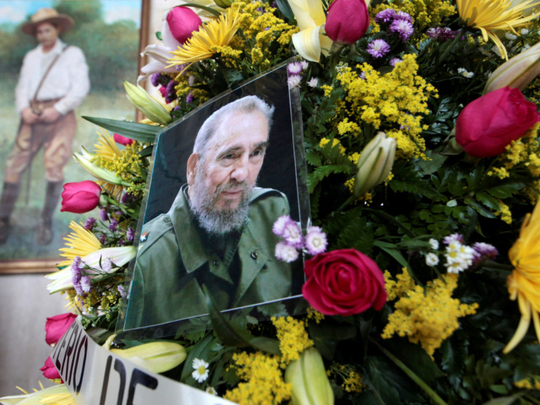
The media in the United States, predictably, mostly castigated the legacy of Fidel Castro variously as irrelevant, brutal, tyrannical and Utopian, while a few ruminated on the future of US-Cuba relations in a post-Castro world.
“Fidel Castro was a survivor, but not a success,” said USA Today. “He survived guerilla warfare in the 1950s and claimed the leadership of Cuba for nearly half a century. He survived a botched attempt to overthrow him, quickly defeating about 1,400 CIA-trained exiles who invaded Cuba at the Bay of Pigs in 1961. He, and the rest of humanity, survived the Cuban missile crisis, which brought the United States and Soviet Union to the brink of a nuclear war the following year.” Observing that by virtue of his “charismatic personality, longevity in office and ability to torment a succession of US presidents”, Castro was a major 20th century figure, the paper said in an editorial: “Ultimately, Castro left a legacy of failure. He stayed in power not by popular consent, but through a brutal dictatorship that imprisoned or executed thousands of opponents. He tried unsuccessfully to export his Marxist revolution throughout Latin America and Africa. And he turned his beautiful island-nation into an economic basket case rather than a socialist utopia.”
The Washington Post highlighted what it called Castro’s terrible legacy and said: “In contrast to his long life of violence, both verbal and physical, Fidel Castro’s demise at 90 was, apparently, peaceful... Mr Castro’s legacy is a 57-year-old ‘revolution’ that once punched above its weight in world affairs, especially in Latin America, but in more recent years became a decrepit museum piece of Soviet-style totalitarianism. Over Fidel’s objections, Raul Castro has tried to adapt and preserve the regime, including through an opening to the United States.”
The Guardian was far more balanced in its tribute, reckoning Castro as a “man of history”.
“Recovering the figure of Fidel Castro from the legacy of the failures of communism, his own chequered reputation, the hours-long flights of rhetorical bombast and hipster beard is no easy task,” it said in an editorial. “One should situate him in the political and intellectual setting of 20th-century Latin American anti-colonialism rather than seeing him through the eyes of the 21st century. Castro’s passing sees the departure of one of the giants of the Cold War-era and a revolutionary guerilla leader. He must be judged by the conditions that made him possible, but not indulged by them.”
In Kenya, the Nation newspaper hailed Castro as a “true friend of Africa” and said: “Considering the bitter rivalry that emerged between the American superpower neighbour and tiny Cuba, a country of only 11 million people, it was often noted that Castro saw off 10 US presidents ... Castro will be mourned far and wide.”
In India, the Hindu paid rich tributes to the late Cuban leader. “With the death of Fidel Castro, the last of the iconic revolutionary figures of the 20th century is now no more ... the era of state-led socialism can now be called to have officially ended. But his ideas on internationalism, a truly democratic world order and solidarity among the people of the third world hold true and important today and for the foreseeable future.”





_resources1_16a31069e4e_small.jpg)






